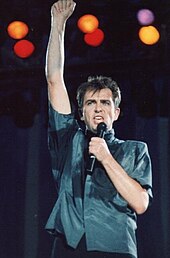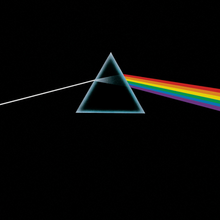Peter Gabriel - 70
Nowadays, rock birthdays are highly celebrated - especially as stars age. Well today my friends, is the 70th birthday of a prominent British musician.



The photo above is Peter Gabriel performing in 1986 during the promotion of his fifth LP, and best-seller So. Gabriel has gone from prog rock to world music in his career but outside the studio and off the stage is also renowned as a human rights activist.
His life...
He was born Peter Brian Gabriel on February 13, 1950 in Woking, Surrey, to a middle class family - a musical mother and a father who was an electrical engineer. He was educated at private schools for the most part such as the Cable House, but his calling came at thirteen when he started attending Charterhouse. By fifteen he hooked up with Tony Banks on piano and percussionist Christ Stewart to start The Garden Wall - a precursor to Genesis.
Genesis
In 1967, as the Garden Wall was breaking up, guitarist Anthony Phillips and bassist Mike Rutherford, of Avon fame - another precursor to Genesis, invited Gabriel, Banks, and Stewart to make a few demos. This eventually led to them being discovered by Charterhouse aluminus Jonathan King (who had a hit in the UK with Everybody's Gone to The Moon in 1965). He signed them to Decca records and named them Genesis - after the creation narrative in Judaism and Christianity.
The band's first single, The Silent Sun, was recorded at the suggestion of King - King being a Bee Gees fan. This led to the issue of Genesis first LP From Genesis to Revelation, a lackbuster pop record. While this LP, and part of Trespasss featured poppy easy listening, the band quickly developed a progressive style by the early 70s making them one of the key players of the then prog rock scene.
After Steve Hackett replaced Anthony Phillips during the making of Trespass, the band found another permanent member - drummer (eventually turned lead singer) Phil Collins after an audition at Gabriel's parents' home. This led to a string of successful records Nursery Cryme (1971), Foxtrot (1972), Selling England by the Pound (1973), and their rock opera, The Lamb Lies Down on Broadway about a Puerto Rican youngster, Rael, living in NYC at the time. It was during the early 70s that Gabriel became known for his costume changes.
Gabriel quit Genesis after the Lamb tour ended in 1975, something that concerned his other four mates; however, the band quickly rebounded with Collins taking on lead vocal and shifted itself into a more mainstream sound.
Solo Career
Gabriel took on piano lessons after leaving Genesis. His first four LPs were all self-titled; Gabriel thought of it as a magazine released each year with a different cover - much like a real magazine. The text was styled the same and it, along with the cover art, was designed by Storm Thorgerson, Aubrey Powell, and Peter Christopherson - the team collectively referred to as HIpgnosis, who was responsible for designing many album covers of the day like the notorious cover of The Dark Side of The Moon, pictured below.

During these first four albums, Gabriel became more into electronics - using the infamous Farlight CMI of the day, hist first hit was an allegory of his departing Genesis, Salsbury Hill, while his fourth album featured Shock the Monkey. It's also worth noting that Geffen records, the North American distributor of his records at the time, randomly titled the fourth LP Security to avoid confusion with his first three.
A Rising Star
His fifth LP, So featured production from Daniel Lanois - who then worked with Brian Eno on a string of U2 records starting with 1984's The Unforgettable Fire. The LP's hits were Sledgehammer, Big Time, and his duet with Kate Bush Don't Give Up. The first two singles feature backing vocals from P.P. Arnold, Coral Gordon, and Dee Lewis in a call-and-response fashion. Sledgehammer was Gabriel's one and only #1 American hit knocking of Genesis' Invisible Touch - the title track going to #4, while the parent LP only made it one notch behind Gabriel's So coming in at #2.
While not released as a single in the UK, In Your Eyes was issued as the third single in the US - peaking at #26. At the end of the song, there is a vocal from Senegalese singer Youssou N'Dour - in tandom with Gabriel's world music influences. The track was also the theme from the 1989 teen drama Say Anything.
Into the 90s
The 90s saw Gabriel turn the other way with his music. His 1992 LP Us focused on personal issues and did not do as well as So. Despite this, Gabriel's 1992-93 tour was a success. Us was also issued as a video, All About Us, and even as a CD-ROM computer game Xplora1: Peter Gabriel's Secret World. In 1999 he reconvened with his fellow Genesis bandmates to make an updated version of The Carpet Crawlers from The Lamb (1974). The version was more trip-hoppy/ambient and featured Collins singing on the third verse. The version can be heard on Genesis' 1999 greatest hits package, Turn it on Again: The Hits.
An activist
I can't leave this post without describing Gabriel's humanitarian work outside of the public eye. His WITNESS was founded in 1992 as a non-profit organization that trains other organizations to use video to advocate for and document human rights. In 1995 Gabriel and Cape Verdean human rights activist Vera Durate were the first to win the North-South Prize - awarded by the Council of Europe's North-South Centre to two figures recognized for their deep commitment, achievements, and hope for humanitraian rights. This is a serious award folks, and goes to show that rock stars are not all about rock.
He has held an annual WITNESS Gala for many years addressing issues of humanitarian rights.
Mr. Gabriel is a man who has stood the test of time, from his Charterhouse days, to his solo high in the mid 80s, to his philanthropical actions since the 90s. Let's use this as a reminder that it's never too late to change, and that the fate of our world lies only within our own hands.

Comments
Post a Comment